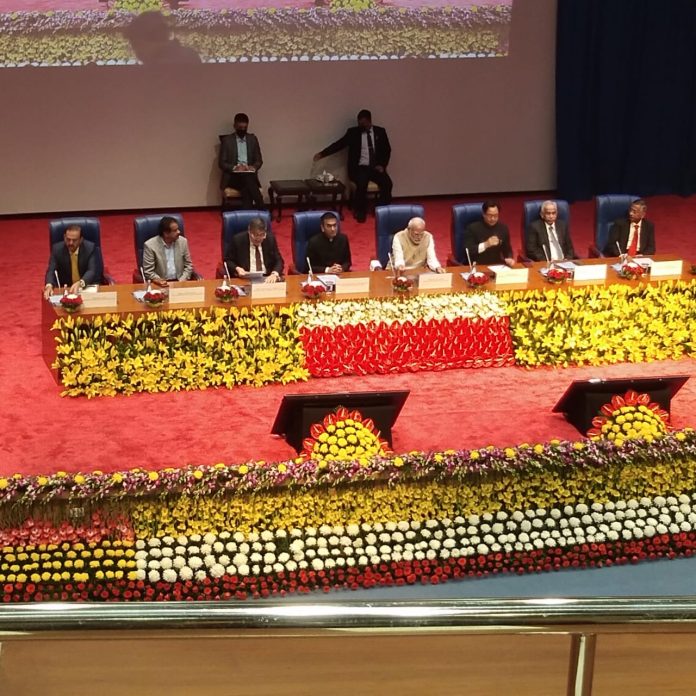Chief Justice of India D.Y. Chandrachud, while stressing on expanding the intent of technology in making the access to justice easy, said on Saturday that it was essential that the judiciary reached out to people, rather than vice-versa.
Speaking during the celebration of Constitution Day at the Supreme Court premises, the CJI said that in order to make justice delivery system accessible to everyone, the Indian judiciary has taken many new initiatives to realise this goal, including the adoption of technology.
He said the adoption of technology in listing of cases and court hearings would help in weeding out the institutional flaws like delay in listing and hearing.
He further said that access to justice should be defined to uphold the faith and perception that the general public had in the legal system.
The CJI noted that the infrastructure of technology should not not be dismantled. He said the Technology must be augmented with institutional reforms to make access to justice easy.
Calling district judiciary as the first point of contact for access to justice, Justice Chandrachud said the district judiciary must be lifted from the mindset of being a subordinate judiciary.
All the judges in India ranging from the district court to the Supreme Court must reflect upon securing the constitutional vision of securing liberty, equality and fraternity, he added.
“Until we open our minds to people with vivid life experiences, we will be lacking in our role as Judges. An institution thrives with time only when it functions democratically. I believe as CJI, it is my responsibility to consult Judges in the Supreme Court, High Courts and district judiciary.
“It is important to tap the rich experience of all these members of the judiciary and that is why it is important that the participation of marginalised communities and women in the legal profession is enhanced,” he added.
Speaking about the Constitution, the CJI said that the story of Constitution was a story of human struggles and sacrifices, of undoing injustices against the marginalised communities of society.
He said the marginalised were the first to bring ideas or equality on Indian law, adding that the first wave of resistance against colonial power came from ingenuous communities.
“India’s liberation from colonial rule and drafting the constitution were simultaneous projects. When India gained her independence, she was plagued by social evils,” noted Justice Chandrachud.
He said the Supreme Court had noted in a judgement in 2018 that in Indian Young Lawyers, the struggle for social emancipation has been going on. He added that the Constitution was the end product of these two struggles
As per the CJI, The Constitution seeks to deliver rights to shrug off colonial baggage. The constitution entrusts the legislature, executive, and judiciary to bridge the gap between institutional ideas and social realities.
He said the scholars have documented the refusal of colonial courts to interfere in cases involving the socio-religious customs, even if the rights of marginalised communities were in question. This changed after the adoption of Constitution.
Stressing that the representation of marginalised communities must be enhanced in the legal profession, the CJI said, “In a nation as diverse as ours, the paramount challenge that Judiciary faces is that justice is made accessible to everyone.”
He said the National Judicial Data Grid was a repository of 77 lakh judgments of the High Court, which were available to every citizen free of cost.
“The jurisprudence emanating from our Indian courts have influenced decisions in South Africa, Kenya, Australia, Jamaica, Uganda, Bangladesh, Singapore, Fiji and others,” noted Justice Chandrachud.
He said virtual access has made it possible for lawyers to argue cases from their own places.
Justice Chandrachud further talked about the e-court initiatives launched by Prime Minister Narendra Modi at the Supreme Court premises today, including the Virtual Justice Clock, JustIS mobile App 2.0, Digital Court and S3WaaS Websites.
He said JustIS Mobile App 2.0 was a mobile application for district judiciary. It was a real time dashboard for all district level courts across the country, having data of the cases instituted, disposed and pendency of cases on day/week/month basis at the Court level. The tool would help the judicial officers and Judges in monitoring the pendency and disposal of cases.
Calling Digital Court as a green initiative of the Judiciary, the CJI said it would make the court records available to Judges in digitised form, thus enabling the transition to Paperless Courts.
Talking about S3WaaS, he said it was a multilingual, citizen friendly and disabled-friendly cloud service developed for government entities to generate Secure, Scalable & Sugamya (Accessible) websites.
Stating that change often happened through small acts of kindness, the CJI appealed to the young minds to dedicate themselves to the social realities of India.


